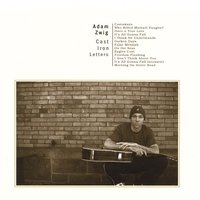|
Adam Zwig, Cast Iron Letters (Conscious, 2007) In Cast Iron Letters, Adam Zwig takes a stylistically different approach to music. His overriding concern, like any other musician, is to communicate; however, the music is a method that seemingly comes secondary to the message. Now, that's not saying that Zwig's music seems secondary or even second-rate, because it's certainly not. It's just that Zwig is almost musically astylish. Even if this reviewer hadn't read the extensive artist notes about his music, specifically the decision to pursue blues and folk in lieu of rock music, I still would have noticed how Zwig's music doesn't fit into any stylistic niche.
Throughout the album, Zwig brings the entire conceptual spectrum of emotion, thought, intention and observation. Seeing as the artist is also a psychotherapist, this should come as no surprise to anyone. Whether he's asking tough questions (such as the true culpability of a fallen soldier in "Who Killed Michael Vaughn?"), proselytizing utopist possibilities ("It's All Gonna Fall") or simply sharing a story of lost love ("Once a True Love"), Zwig is never preachy or approaching the listener from a lofty height of greater knowledge that so many musicians take. Instead, he's more of an offbeat ethereal Jiminy Cricket on our shoulder, asking questions and considering possibilities in lieu of providing direction and advice. Cast Iron Letters is a very cerebral album, the type that is intended as an experiential entirety rather than segmented or individual tracks. Think of it as chapters in a novel or paragraphs in an article -- some aspects are more enjoyable than others, but every part contributes towards the cohesive whole. Note that this novel -- er, album is certainly not light listening but is certainly worth the effort. 

|

Rambles.NET review by C. Nathan Coyle 26 January 2008 





|

